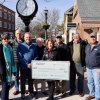Good nutrition is the key to preventing breast cancer
Breast cancer is the most common type of cancer among women in the United States other than skin cancer. In 2013, more than 232,000 American women will be diagnosed with breast cancer.
All cancers originate from DNA damage, but relatively few are inherited. The vast majority of DNA damage results from environmental exposures accumulated over the lifetime of a person. While there are significant genetic factors that affect individual response to DNA insults, experts agree that avoiding or eliminating exposure to risk factors such as obesity, smoking, radiation, and toxins combined with increasing physical activity and fruit and vegetable intakes could greatly reduce cancer incidence and mortality worldwide.
Some of the major risk factors for breast cancer include increasing age, BRCA mutations, family history of breast cancer involving a first-degree relative and personal history of invasive breast cancer. These risk factors are nonmodifiable. But good nutrition and a well-balanced diet certainly can reduce the risk and prevent cancer, and these are modifiable risk factors. Let's look at some key elements in the diet that may have benefits.
Many studies have found an association between alcohol use and breast cancer risk. A seven-year prospective British study of 1 million women found a dose-response relationship between alcohol and breast cancer. An increase in breast cancer incidence was measurable at 1 drink per day. A large American study found a similar relationship between lifetime alcohol use and breast cancer risk, with increasing risk for drinking at a very young or a very old age. There are some other studies which have have found little relationship between alcohol and breast cancer, but still, quitting or cutting down on alcohol would definitely help. Women who choose to drink should restrict themselves to no more than one drink a day.
Consumption of a wide variety of whole, plant-based foods is more important than reliance on single-ingredient extracts or supplements.. This is because diverse phytochemicals act synergistically within the body. Phytochemicals are found in plant-based foods such as fruits, vegetables, beans, and grains. Phytochemicals are often brightly colored, and different-colored fruits and vegetables have different phytochemicals, therefore a rainbow of colors from vegetables and fruits can be used as a surrogate marker for adequate variety in the diet. Try to eat five to seven servings of fruits and vegetables from each color group.
Keep a healthy balance of protein, carbohydrate and fats in the diet. Avoid processed meats. When consuming fats, make sure they are omega-3 fats. Protective effects of omega-3 fatty acids from fish against breast cancer are strongest for postmenopausal women. Flax seed is by far the foremost vegetarian source of omega-3 oils. But there is another reason to consider adding flax seed as a daily preventive for women. Flax seeds are high in lignans, a phytoestrogen that in animal studies prevents breast cancer. Flax seeds are also high in fiber. Try to eat freshly ground flax seeds instead of taking a flax seed oil capsule.
Breast cancer incidence is lower in populations whose traditional diets include generous amounts of soy. Research suggests that the protective effects of soy on the breast come from its phytoestrogen properties (its ability to partly block estrogen receptors in the breast), and is related to high concentrations of a class of compounds called isoflavones. Both animal and human studies suggest that soy foods are most effective in preventing breast malignancies when consumed in childhood and adolescence. Due to its estrogen-like effect, soy intake has been controversial and definitely should be avoided after the diagnosis of breast cancer.
There is also good reason to specifically recommend high levels of cruciferous vegetable intake for breast cancer prevention. This delicious family of vegetables includes broccoli, cauliflower, kale, cabbage, Brussels sprouts, bok choy, and others, all rich in sulforaphane, flavones, and indole-3-carbinol (I3C). These are all potent anti-cancer compounds; I3C increases the liver metabolism of the active 16-hydroxyl estrogen to the relatively inactive 2-hydroxyl form.
Onions are high in a nutrient called quercetin, which was shown in a 2006 publication to decrease estrogen receptor activity in breast tumors and to help regulate apoptosis. Garlic, onion’s relative, also shows promise in breast cancer prevention. Many green vegetables such as spinach, chard, and asparagus can be considered specific breast cancer prevention foods due to their high concentrations of folate and antioxidant carotenoids.
Mushrooms as a group are rich in both medically active compounds and toxins. Recent research reinforces traditional understanding of the anti-cancer properties of reishi, maitake, and shiitake mushrooms. Spices have a long history of traditional use as both medicine and food. Turmeric (primarily its active ingredient curcumin) has been shown to inhibit growth of breast cancer cells induced by laboratory exposure to pesticides.
Tea has powerful medicinal properties, especially green tea, which is high in antioxidants and useful in protecting against the many potentially carcinogenic oxidative stress triggers found in modern life. Two to three cups of tea can be refreshing and have benefits.
Many members of the berry family are recognized for their cancer-preventing properties, especially blueberries, Strawberries and raspberries have potent antioxidant properties and also assist the liver in detoxification of carcinogenic chemicals; they been shown to slow breast cancer cell growth in vitro.
In conclusion, research suggests that if all U.S. women implemented optimal breast cancer prevention practices, including nutrition and healthy food choices, healthy weight maintenance, and adequate physical activity, 38 percent of breast cancer cases might be avoided. That means roughly 73,000 cases of breast cancer would be prevented yearly. But until that occurs, we are faced with the realization that the same number of women may learn of a frightening and even life-threatening diagnosis every year. Perhaps that realization will lend urgency to our efforts to help prevent breast cancer with nutritional interventions. it is imperative to acknowledge that not all breast cancer will be prevented by lifestyle strategies, and that indeed, the lifestyle strategies considered prudent may be modified in the future as we learn more about breast cancer etiologies.
Always remember prevention is better than cure. Eat healthy, be healthy.
Dr. Uday Jani is board certified in internal medicine and fellowship trained in integrative medicine. His practice is Shore View Medical PA, 28312 Lewes-Georgetown Highway, Milton, 302-684-0990.




















































